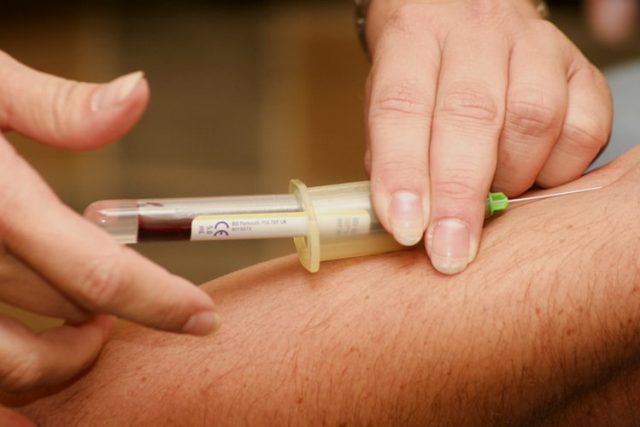President Rodrigo Duterte in his latest national address claimed that an “antibody” against the novel coronavirus would be available by May.
In his televised address that aired late Monday, Duterte claimed that a big pharmaceutical company is developing a cure against the new virus using antibodies “not from humans.”
He said that he would only lift the enhanced community quarantine he imposed over Luzon if this cure became commercially available next month.
Duterte approved the extension of the enhanced community quarantine until April 30. This umbrella measure was initially set to end last April 12.
“Kung meron na ‘yan tapos makita ko na ginagamit na ng tao, ili-lift ko. Tutal kung magkasakit kayo may antibodies naman tayo mabili. Ngayon, kung wala kang mabili, problema mo na ‘yan,” he said.
According to the president, the pharmaceutical firm told him that they would market this cure this May. However, it’s possible that wealthier Filipinos might be the only ones who can afford it.
“Meron ng medisina, antibody ang isang giant pharmaceuticals. Tapos naghahabulan sila. Sabi by May baka they would start to market it, ipabili na nila,” Duterte said.
“Ang problema sabi nga ni…we are on the last ladder. Ang mauna niyan ‘yung mga mayaman na…kasi marami ‘yan eh, kailangan. So as fast as they can really manufacture or farm out the product, just retain the copyright para magtulungan sila,” he added.
Duterte did not disclose the name of the pharmaceutical company he was referring to.
On Tuesday, Cabinet Secretary Karlo Nograles, also the spokesperson of the task force on handling COVID-19, said that he is not aware of the pharmaceutical firm since the supposed cure was mentioned during their meeting with top officials dealing with the health crisis.
Pharmaceutical companies in different parts of the world have been developing potential vaccines and drugs against the new pathogen.
Some online users also shared that there are no COVID-19 cure yet as clinical trials are still underway.
I was intrigued by Pres. Duterte’s ‘antibody’ statements, and after some light research, there are indeed initiatives being done to fight COVID-19 by using antibodies from COVID-19 survivors.
It’s just that, It would take months before these can be approved for human trials. pic.twitter.com/8zm71aEgli— mike (@jmeguay) April 13, 2020
COVID-19 medical research developments by May 2020
Reuters on Tuesday reported that “while a safe, effective vaccine is still more than a year away, some researchers are rushing to repurpose existing drugs and non-drug therapies as well as testing promising experimental drugs that were already in clinical trials.”
It said that initial results of Kaletra (Lopinavir/Ritonavir) – Abbvie is “expected as soon as May 2020.”
This is an “antiviral combination used to treat and prevent HIV infections.”
“More than twenty trials around the world are testing the drug as a COVID-19 treatment or post-exposure prophylaxis for people with high-risk close contact with a confirmed case,” the report said.
According to the report, doctors at Jinyintan Hospital, in COVID-19 epicenter Wuhan, China said that they believe in Kaletra as a “second drug” that helped treat some of its COVID-19 patients.
RELATED: Reasons for hope: the drugs, tests and tactics that may conquer coronavirus
Last Friday, U.S. Drugmaker Eli Lilly & Co said that it began the clinical testing of therapies for the COVID-19 illness caused by the coronavirus, according to another Reuters report.
The Reuters report said that the company “had entered into an agreement with the National Institute of Allergy and Infectious Diseases to study the baricitinib drug to examine its efficacy and safety as a potential treatment for hospitalized patients diagnosed with COVID-19.”
“The study will start this month in the United States and will then expand to other sites in Europe and Asia, the company said in a statement, adding results from the study are expected within two months,” the report added.
Aside from this therapy, vaccine company Novavax Inc. said its Matrix-M adjuvant would be used with the vaccine candidate – NVX-CoV2373 – to enhance immune responses.
“Trial in 130 adults is expected to begin in mid-May with with preliminary immunogenicity and safety results in July, according to the company,” a Reuters report read.
The vaccine is seen as “strong immunogenicity in animal tests, but might require two doses in humans, which would limit supply.”
Plasma therapy
Meanwhile, in the Philippines, some patients who have recovered from COVID-19 such as Senator Sonny Angara donated their blood to be used for an age-old treatment called convalescent plasma therapy.
Dr. Jonas Del Rosario, spokesperson of COVID-19 referral hospital Philippine General Hospital, said that plasma contain antibodies.
Angara said survivors’ plasma can help cure COVID-19 patients. He said he is hopeful that the Department of Health, the Department of Interior and Local Government and the IATF can help share databases to ask COVID-19 patients to share their plasma.
“The moment plasma is given it goes straight to a COVID19 patient. Please tell any survivors you know. There is no stigma and they can save lives,” the senator said.
Del Rosario, however, said the convalescent plasma therapy is still under experiment.
According to an article from Time magazine, plasma therapy is a 19th century approach that uses plasma from recovered patients.
American Society of Hematology said there were evidence for its benefit against rabies, hepatitis B, polio, measles, influenza, Ebola and other pathogens.
“The idea is to use immune cells extracted from the blood of people who have recovered from COVID-19 and infuse them into those who are infected, giving them passive immunity to the disease, which could at least minimize some of its more severe symptoms,” the Time article read.
Plasma is the largest component of human blood that carries the white blood cells, red blood cells, and antibodies throughout the body.
The website of Stanford Children’s Health explained that when humans donate blood, health professionals can isolate vital components from the plasma to be used as treatments for medical emergencies such as burns and trauma, and potentially save lives.
“The proteins and antibodies in plasma are also used to create therapies for rare chronic conditions, such as autoimmune disorders and haemophilia,” the site explained.
Such is the same goal that scientists hoped to achieve to fight the deadly virus called SARS-CoV-2 which causes COVID-19, that is, the use of the human body’s own immune system.
Pharmaceutical and biotechnology firms around the world, however, are still isolating the antibodies with the strongest chance of neutralizing SARS-CoV-2.
Late last March, the New York Blood Center became the first facility in the US to start its blood collection from recovered COVID-19 patients specifically for plasma therapy.
Other COVID-19 cure ‘candidates’ offered by other countries
On Wednesday, Nograles said that Duterte told Japanese Prime Minister Shinzo Abe about the Philippines’ willingness to participate in Japan’s clinical trials for Avigan, the brand name for an anti-flu drug called favipiravir.
This drug is among the medicines seen as possible cure COVID-19.
This virtual meeting ASEAN Plus Three Summit on COVID-19 was held on Tuesday with with fellow Asian leaders and heads of China, Japan and South Korea.
Another candidate in the battle against the new pathogen is a vaccine called mRNA-1273 that began its first human trial in the United States.
This vaccine was developed by the US National Institutes of Health (NIH) scientists and collaborators at biotechnology company Moderna, which is based in Cambridge, Massachusetts.
It is not certain if this is the type of antibody cure Duterte is referring to. However, neither of these treatments will be available in the market this May.










